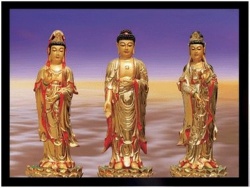The space element
Our tendency to Peace, Quiet, Stillness, Inclusiveness, and Awareness is our internal expression of the Space element. Our degree of awareness is directly related to our sense of space.
The sense of hollowness or emptiness in our thoughts and feelings is also an internal expression of the space element. This hollowness comes about because of the inability of our thoughts and feelings to remain in place and to be permanent and everlasting.
We experience this same hollowness in regards to external objects and situations. Because they arise from space and return to space, they are insubstantial and constantly disintegrating. We may resist or become afraid of this sense of hollowness and feel, with each disappearance outside of us or inside of us, that we ourselves are disappearing. This is because we are unfamiliar with this notion of impermanence and have not learned how to work with the perception and the experience of space.
We tend to look at space as something separate from or outside of us, or as outside of the world, or as the destroyer of the world. In reality, space is a part of us and an integral part of everything around us.
We know from science that our own bodies and the objects around us are composed of atoms which have a lot of space between them, but they are held together through magnetic forces. Besides being mostly made of water, we are also mostly made of space.
Also, we know that nothing in the universe is really created or destroyed, it merely changes form. When we die, if we are buried, insects eat our flesh and defecate out the remainders into the ground. The carbon, phosphorous and other minerals rejoin the earth through the decomposition of our bodies and are taken up by the plants, which are then eaten by animals. Oxygen, and other components are released into the soil and the air as gases. So even our bodies, though they stop existing as bodies, their components continue to exist. Space provides the container in which all of this "creation" and "destruction" takes place.
What we call the universe in our current science is called a world system in Buddhism. The real universe contains everything, it is one ,and the one and only reality, from which no one can escape (hence the word "uni"- verse). Modern science is even afraid of this space, because they don't asked the question, what do we call the place where the "universe" originated from? They always start looking at their universe from the point of the contents of our current world system. They even try to describe the spaces in our world system as "dark matter". In Buddhism, there are many world systems that arise from space and return to space. This means that, in the real universe, it is impossible to find a beginning or an ending and that there is continuous arising and passing away taking place in that container of space.
Shamata meditation helps us to become relaxed with space and its manifestations as hollowness or emptiness, stillness, quietness, detachment, and calmness. Because of meditation practice, we become more and more aware of space until we get to the point where we are always aware of the space in which things happen.
There are other ways of connecting with space. Sitting quietly doing something enjoyable can help. Stepping away from our normal activities to go for a walk in nature, or to sit by a lake, or on a park bench are good to do. Even just standing outside and closing our eyes and allowing ourselves to just listen and feel what's around us can help us reconnect with space and aspects of our world that we don't usually pay much attention to. These are all ways of reconnecting with stillness, quiet, and give ourselves a break from our habitual, normal chaotic life.
As we learn to be aware of space in a relaxed way, we begin to recognize that space can't harm us. We also learn that we don't always have to fill up the space around us. Sometimes we fill up space to reassure ourselves that we're alive and that we will continue to live. Through meditation, we learn that experiencing space, stillness, and quiet can actually be helpful and useful.
Once we've tasted a sense of space within meditation, we begin to notice how things outside of us arise from space and return to space. After a while, we begin to notice how our own thoughts, feelings, perceptions, intentions and consciousness arise and pass away within Space. Through our perception of Space and the background within which things happen, we see the interconnection between these various things. This space also allows us to see things more objectively.
In our meditations, if we want to become even more aware of space, we could use an empty bowl as an concentration object and focus on the emptiness inside the bowl, or we could cut a hole in an object and focus on that.
When we examine or contemplate the nature of Space, we may notice that Space is all-encompassing. It gives a sense of openness. Space is inside of everything and surrounds everything. It is transparent, without substance. It is accommodating. It expands as needed to include everything. It can provide comfort as it envelops everything like a blanket. It contains everything no matter how big or loud or chaotic. It allows us to perceive. As our sense of space changes, our awareness changes.
By incorporating this sense of space into our minds, we also begin to have this sense of openness, this sense of limitless potential. We get a sense of timelessness from our connection with Space. We also tend to be more accommodating and inclusive. This also means that we are less afraid of circumstances and less frustrated or upset. We end up feeling that there is more than enough space for our thoughts and fellings and the thoughts and feelings of others. Our sense of space can comfort us in times of trouble as we recognize that even our troubles and the chaos in our lives arises and passes away within the blanket of our sense of space.
When we are overwhelmed, we can use our connection to space, quiet, peace, and stillness to rejuvenate, or to change focus and put things into perspective. These are all the benefits of developing awareness, comfort, and mastery in our experience of the space element.


